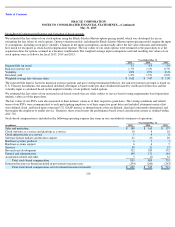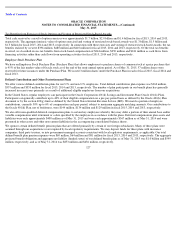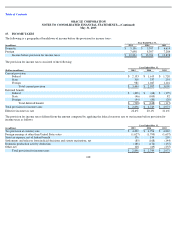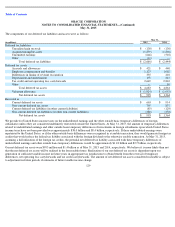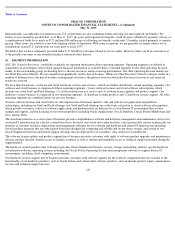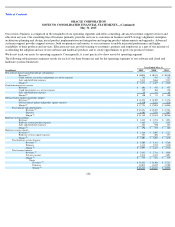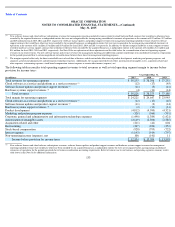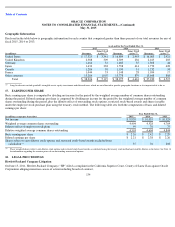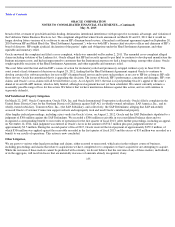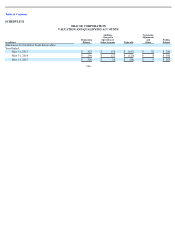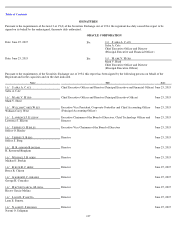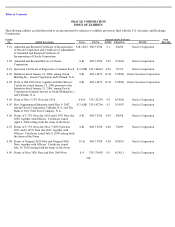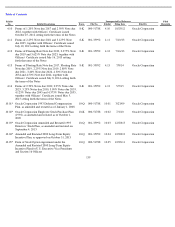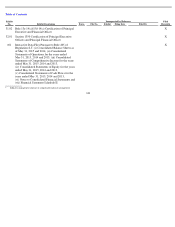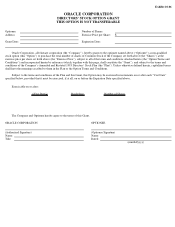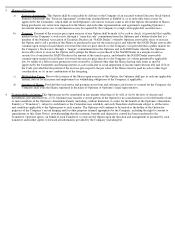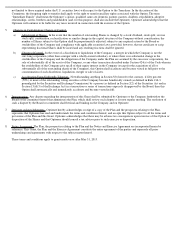Oracle 2014 Annual Report Download - page 139
Download and view the complete annual report
Please find page 139 of the 2014 Oracle annual report below. You can navigate through the pages in the report by either clicking on the pages listed below, or by using the keyword search tool below to find specific information within the annual report.
Table of Contents
ORACLE CORPORATION
NOTES TO CONSOLIDATED FINANCIAL STATEMENTS—(Continued)
May 31, 2015
breach of the covenant of good faith and fair dealing, defamation, intentional interference with prospective economic advantage, and violation of
the California Unfair Business Practices Act. The complaint alleged that when Oracle announced on March 22 and 23, 2011 that it would no
longer develop future versions of its software to run on HP’s Itanium-based servers, it breached a settlement agreement signed on September 20,
2010 between HP and Mark Hurd (the “Hurd Settlement Agreement”), who was both HP’s former chief executive officer and chairman of HP’s
board of directors. HP sought a judicial declaration of the parties’ rights and obligations under the Hurd Settlement Agreement, and other
equitable and monetary relief.
Oracle answered the complaint and filed a cross-complaint, which was amended on December 2, 2011. The amended cross-complaint alleged
claims including violation of the Lanham Act. Oracle alleged that HP had secretly agreed to pay Intel to continue to develop and manufacture the
Itanium microprocessor, and had misrepresented to customers that the Itanium microprocessor had a long roadmap, among other claims. Oracle
sought equitable rescission of the Hurd Settlement Agreement, and other equitable and monetary relief.
The court bifurcated the trial and tried HP’s causes of action for declaratory relief and promissory estoppel without a jury in June 2012. The
court issued a final statement of decision on August 28, 2012, finding that the Hurd Settlement Agreement required Oracle to continue to
develop certain of its software products for use on HP’s Itanium-based servers and to port such products at no cost to HP for as long as HP sells
those servers. Oracle has announced that it is appealing this decision. The issues of breach, HP’s performance, causation and damages, HP’s tort
claims, and Oracle’s cross-claims will all be tried before a jury. As of April 8, 2013, the trial is stayed pending Oracle’s appeal of the court’s
denial of its anti-SLAPP motion, which is fully briefed, although oral argument has not yet been scheduled. We cannot currently estimate a
reasonably possible range of loss for this action. We believe that we have meritorious defenses against this action, and we will continue to
vigorously defend it.
SAP Intellectual Property Litigation
On March 22, 2007, Oracle Corporation, Oracle USA, Inc. and Oracle International Corporation (collectively, Oracle) filed a complaint in the
United States District Court for the Northern District of California against SAP AG, its wholly-owned subsidiary, SAP America, Inc., and its
wholly-owned subsidiary, TomorrowNow, Inc., (the SAP Subsidiary, and collectively, the SAP Defendants) alleging that SAP unlawfully
accessed Oracle’s Customer Connection support website and improperly took and used Oracle’s intellectual property.
After lengthy judicial proceedings, including a jury verdict in Oracle’s favor, on August 2, 2012, Oracle and the SAP Defendants stipulated to a
judgment of $306 million against the SAP Defendants. We recorded a $306 million receivable in our consolidated balance sheet and we
recognized a corresponding benefit to our results of operations for the first quarter of fiscal 2013. After further proceedings, including an appeal,
on November 14, 2014, final judgment was entered in Oracle’s favor in the amount of $356.7 million plus post-judgment interest of
approximately $2.5 million. During the second quarter of fiscal 2015, Oracle received the total payment of approximately $359.2 million, of
which $306 million was applied against the receivable recorded in the first quarter of fiscal 2013 and the excess of $53 million was recorded as a
benefit to our results of operations. This action is now concluded.
Other Litigation
We are party to various other legal proceedings and claims, either asserted or unasserted, which arise in the ordinary course of business,
including proceedings and claims that relate to acquisitions we have completed or to companies we have acquired or are attempting to acquire.
While the outcome of these matters cannot be predicted with certainty, we do not believe that the outcome of any of these matters, individually
or in the aggregate, will result in losses that are materially in excess of amounts already recognized, if any.
135



